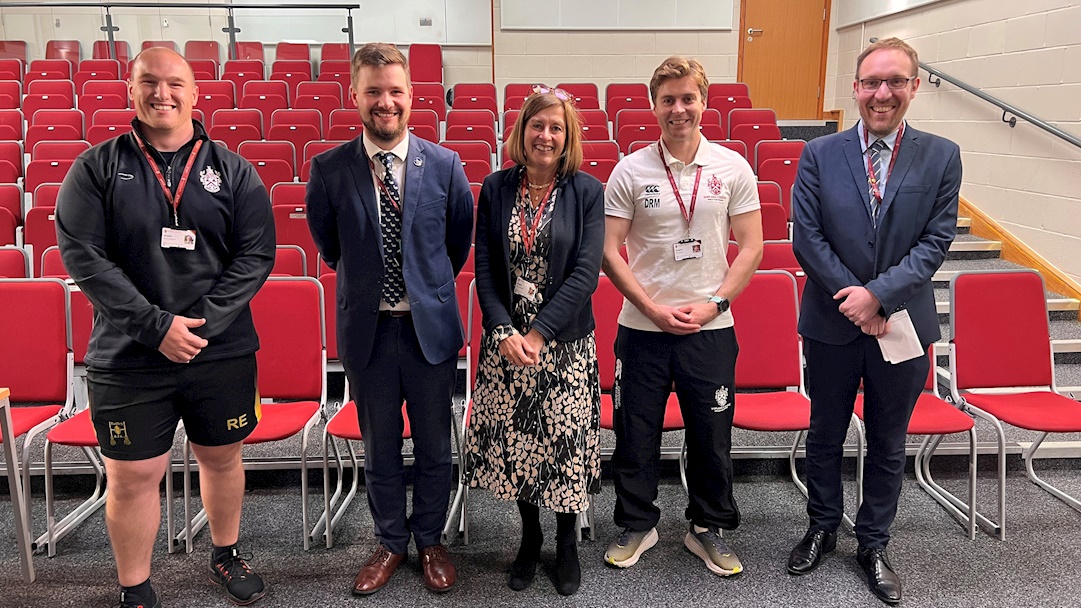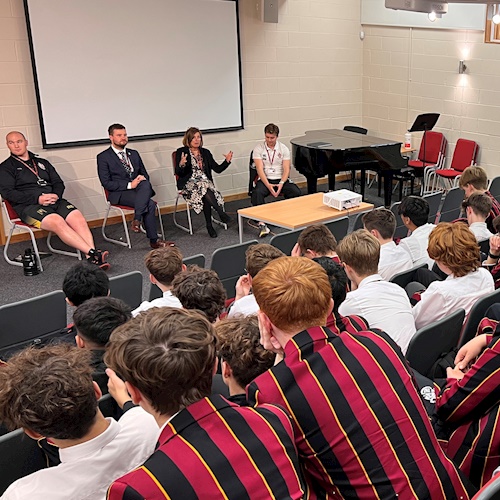
On Thursday 6 October, our Year 10 pupils gathered in the Lecture Theatre for the second Question Time of the academic year. Host Mr Player, in his usual dynamic and witty way, introduced the super panel which included the man "at the centre of the scrum and here to make everyone look dumb" that is Mr Edwards; Mr Cooper, who "likes to be out mapping, but today may be capping"; Mrs Morgan who "likes to find the square root, but today may be given the boot"; and Mr Miller – will he drop the mic, or be "on his bike"?
In light of the recent arguments about tax, should rich people who earned their money have to pay for everyone else?
Mr Miller, while acknowledging that it is a divisive issue, believes that it comes down to morality. The young look after the elderly. The healthy look after the sick. He added that "it’s our moral responsibility to help someone. If we can afford to help, we should." Mrs Morgan agreed with Mr Miller, adding that we should still be helping people even if born into a position of privilege.
Mr Cooper also agreed, adding that a person’s tax may help take care of somebody, or help with an individual’s education. He treats tax like an insurance in that it helps other people. However, he did add that the main issue with tax lies with big corporations that avoid paying - "if companies weren’t in a position to avoid paying their taxes in multiple countries, then perhaps there wouldn’t be a need to tax individual people."
Mr Edwards questioned the concept of being rich and how it can be quantified. Nonetheless, he agreed with Mr Cooper on taxing the mega-rich companies and believes that the government is yet to get this right.
Are improvements in technology going to make the world better – or worse?
Mr Cooper described himself as a big lover of technology and has recently bought himself a VR headset! He believes that we should embrace technology and that it will make jobs easier. Bringing technology into the field of geography, he added that "technology will help us get out of a lot of problems such as climate change," and from a personal perspective, added that technology has had a big influence in areas such as food research, which has had a positive impact for vegetarians such as himself.
Mr Edwards, similarly to Mr Cooper, is all for technology, although is wary of the 'metaverse'. He expanded, "while technology does solve a lot of problems, I think it [the metaverse] is detrimental to human existence. People can go online from their living room, unplugged from reality." He added that he is not so keen on the idea of microchip implants in the brain, which is in the process of being researched by tech companies such as Tesla (Neuralink).
Mrs Morgan, perhaps unsurprisingly coming from the College’s Computer Studies teacher, described herself as pro-tech, and believes that benefits of technology far outweigh the more negative sides of it. While there are detrimental sides of technology such as cyberbullying, extortion and scamming; she believes that technology does help with the management of our daily lives through aspects such as health and finance.
Coming to the panel with a highly contrasting opinion, Mr Miller finds technology to be 'insidious' – using the TV drama Black Mirror as an example. While admitting that there are lots of positives, Mr Miller continued by adding that he "finds it sad when you go into a café or restaurant and see everyone on their phone. It makes us lose touch with the best things that make us human."
Why do we even have detentions? Does it actually work?
In a setting where the panellists are all teachers, it was perhaps not a shock to the Year 10 audience that all were in favour of handing out detentions. Mrs Morgan was first to answer saying that she sees detention not so much as a punishment, but rather as an opportunity for pupils to complete work that has been assigned and not completed. She added that "detention is effective in that pupils, during that time, will do the prep that has been assigned to them."
Mr Miller, who by his own admission is not the biggest giver of detentions or infractions, nonetheless believes that "detentions prepare you for later life – if you miss a deadline, there will be consequences". Similarly, Mr Cooper agreed that detentions help with learning about consequences and that "in the real world, the working world, missing a deadline could result in getting the sack."
Mr Edwards, opting for a more practical approach, asked the audience if they don’t like detention – to which the vast majority of pupils raised their hands in agreement. In response, he said "that’s why you have detentions. It is not meant to be something that is enjoyed, but rather a way of reinforcing correct behaviour." He added that at school, pupils are protected in a bubble where the stakes and consequences are not as high as in the working world.
Finishing off the session, Mr Player then asked the super panel, much to the audience’s delight, about their own detention experiences. Mrs Morgan said that she had never been on the receiving end of a detention but only because her school didn't give them out. She did, however, admit that this meant that she had to learn the hard way in regards to academic work by way of resitting exams.
Mr Edwards, the very same panellist who agreed with handing out detentions, admitted that he has had more detentions than can be counted! However, he added that each one was a learning lesson and eventually, by Sixth Form, school life was a lot smoother and he obtained good exam results.
Mr Cooper has been on the receiving end of two detentions during his school years – one for not doing his homework and the other, in a bizarre turn of circumstances, as a result of false identity. Mr Cooper had been off sick and a classmate had used his name instead during a cover lesson and so despite not being present, Mr Cooper had to sit the detention regardless.






















